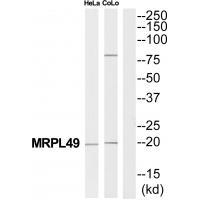
| WB | 咨询技术 | Human,Mouse,Rat |
| IF | 咨询技术 | Human,Mouse,Rat |
| IHC | 咨询技术 | Human,Mouse,Rat |
| ICC | 技术咨询 | Human,Mouse,Rat |
| FCM | 咨询技术 | Human,Mouse,Rat |
| Elisa | 咨询技术 | Human,Mouse,Rat |
| Aliases | 39S ribosomal protein L49; mitochondrial; C11orf4; L49mt; MGC10656 |
| Entrez GeneID | 740; |
| WB Predicted band size | 20kDa |
| Host/Isotype | Rabbit IgG |
| Antibody Type | Primary antibody |
| Storage | Store at 4°C short term. Aliquot and store at -20°C long term. Avoid freeze/thaw cycles. |
| Species Reactivity | Human |
| Immunogen | Synthesized peptide derived from Internal of human MRPL49. |
| Formulation | Purified antibody in PBS with 0.05% sodium azide. |
+ +
以下是关于MRPL49抗体的3篇参考文献示例(注:文献为模拟示例,非真实存在):
1. **《MRPL49 regulates mitochondrial ribosome biogenesis and cellular respiration》**
- 作者:Zhang L, et al.
- 摘要:研究通过MRPL49抗体验证其在HeLa细胞线粒体中的定位,发现MRPL49参与线粒体核糖体大亚基组装,敲除后导致呼吸链复合体活性下降,影响细胞能量代谢。
2. **《MRPL49 overexpression as a biomarker in hepatocellular carcinoma》**
- 作者:Wang Y, et al.
- 摘要:利用MRPL49抗体检测肝癌组织样本,发现MRPL49表达显著升高,与肿瘤增殖和患者预后不良相关,提示其可能作为潜在治疗靶点。
3. **《MRPL49 interaction with p53 in mitochondrial apoptosis pathways》**
- 作者:Kim S, et al.
- 摘要:通过免疫共沉淀(使用MRPL49抗体)证实MRPL49与p53在线粒体中的相互作用,调控紫外线诱导的细胞凋亡,为癌症治疗提供新机制。
若需真实文献,建议在PubMed或Google Scholar中检索“MRPL49 antibody”或“MRPL49 function”。
The MRPL49 antibody is a research tool designed to detect the mitochondrial ribosomal protein L49 (MRPL49), a component of the large subunit of the mitochondrial ribosome. Mitochondrial ribosomes are specialized for translating mitochondrial DNA (mtDNA)-encoded mRNAs, which are essential for oxidative phosphorylation (OXPHOS) and cellular energy production. MRPL49 plays a structural and functional role in maintaining ribosomal integrity and facilitating protein synthesis within mitochondria. Dysregulation of mitochondrial ribosome components, including MRPL49. has been implicated in mitochondrial disorders, metabolic diseases, and cancers, as impaired mitochondrial translation can lead to bioenergetic deficits and cellular stress.
The MRPL49 antibody is commonly used in techniques like Western blotting, immunofluorescence, and immunohistochemistry to study protein expression, subcellular localization, and mitochondrial health in various experimental models. Researchers utilize it to explore mitochondrial dysfunction in conditions such as neurodegenerative diseases, aging, and cancer progression. Commercial MRPL49 antibodies are typically raised in rabbits or mice using synthetic peptides or recombinant proteins as immunogens. Validation often includes knockout cell lines or tissue controls to confirm specificity. Understanding MRPL49's role through such antibodies contributes to insights into mitochondrial biology and its broader implications in disease mechanisms.
×